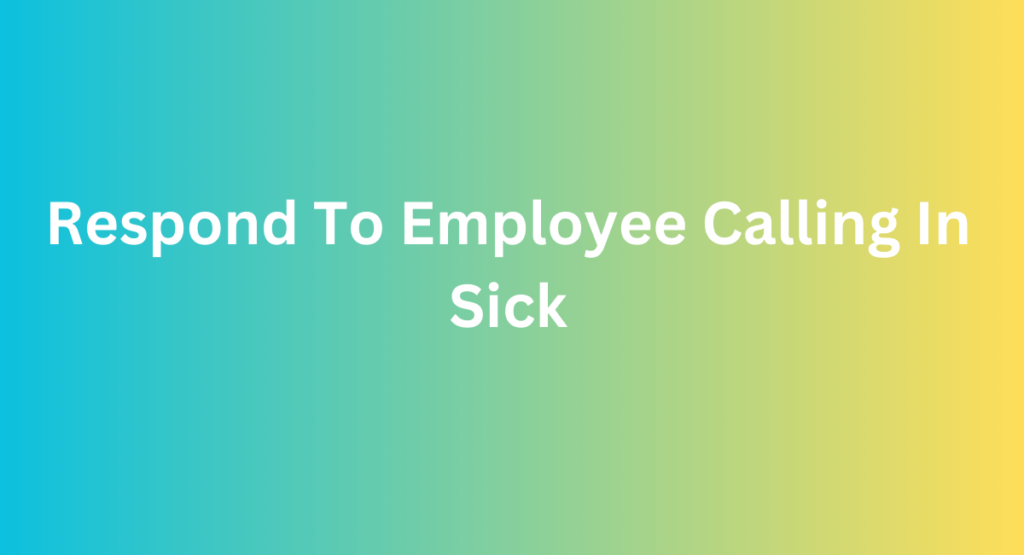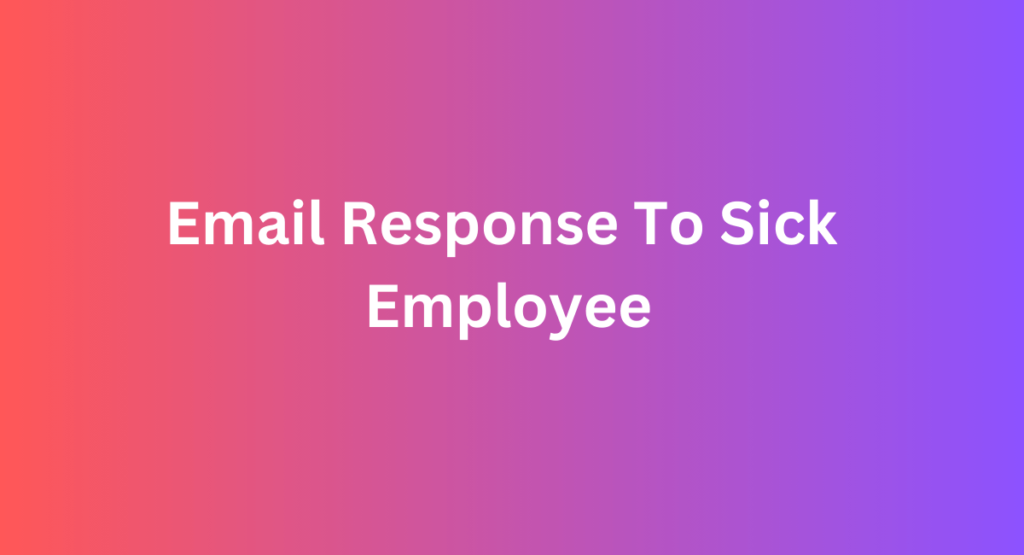
When someone is not feeling well, respond professionally by expressing concern and offering support. A sympathetic message can convey empathy and show that you care about their well-being.
It is important to be genuine and considerate in your response, providing comfort and assistance where possible. Being supportive and understanding during their time of illness can help strengthen your relationship and demonstrate compassion in a professional setting. It is always appreciated when colleagues or clients feel valued and supported, especially when they are experiencing health challenges.
By responding thoughtfully and professionally, you can foster a positive and caring work environment.
How To Reply If Someone Is Not Feeling Well Professionally

When a colleague feels unwell, respond with empathy and offer support. Express concern and suggest they take time to rest and seek medical help if needed. Ensure they feel understood and offer assistance with work responsibilities if necessary.
When someone you work with isn’t feeling well, responding professionally and empathetically can make a significant difference. Here are some tips on.
Express Empathy And Concern
- Begin your response by expressing empathy and concern for the person’s well-being.
- Let them know that their health is important to you and that you are sorry to hear they are not feeling well.
Offer Support And Flexibility
- Offer your support and understanding, and emphasize that their health comes first.
- Let them know that you are open to providing any necessary assistance and that they should take the time they need to recover.
Provide Information On Sick Leave Policies
- If applicable, provide information on sick leave policies or any necessary procedures for reporting their absence from work.
- Offer to help them navigate any documentation or requirements related to their absence.
Suggest Seeking Medical Attention
- Encourage the individual to seek medical attention if necessary, and remind them of the importance of prioritizing their health.
- Offer to assist them in any way you can, such as finding a nearby healthcare provider or offering transportation if needed.
Maintain Communication And Follow-up
- Communicate that you will be available to provide updates or additional support as needed.
- Express your willingness to check in on them periodically and inquire about their well-being.
here are 10 replies to someone who is not feeling well professionally:
1. “I’m sorry to hear that you’re not feeling your best. Remember, setbacks are just opportunities for comebacks.”
2. “Hang in there! Everyone faces challenges at work sometimes. You’ve got what it takes to overcome this.”
3. “I understand how tough it can be. Take some time for yourself, and don’t hesitate to ask for support if you need it.”
4. “It’s okay to feel this way. Just know that setbacks are temporary, and you’ll bounce back stronger than ever.”
5. “You’re not alone in feeling this way. We all have our rough patches. Let’s work through this together.”
6. “I believe in your resilience and ability to overcome any obstacles. You’ve got this!”
7. “Remember, even the most successful people face setbacks. It’s how we learn and grow from them that matters.”
8. “Take a deep breath and know that this feeling won’t last forever. You’re capable of overcoming anything that comes your way.”
9. “It’s okay to take a step back and reevaluate. Your well-being is important, and sometimes that means taking a break to recharge.”
10. “You’re stronger than you think. Don’t let this setback define you. Keep pushing forward, and brighter days will come.”
Keep in mind that responding to someone who is not feeling well professionally requires a delicate balance of empathy, support, and understanding. Your response can greatly impact their experience and well-being, so approach the situation with genuine care and consideration.
Words Of Encouragement For Sick Person

When responding to someone who is not feeling well, offer words of encouragement and support. Stay positive and express empathy towards their situation. A simple message conveying care and well wishes can make a big difference in lifting their spirits.
Words Of Encouragement For A Sick Person
Offering Support:
- Show empathy by acknowledging their feelings: Let them know you understand what they are going through.
- Reassure them that it’s okay to prioritize their health: Encourage them to take the time they need to rest and recover.
Expressing Care:
- Send positive thoughts and well wishes: Let them know you are thinking of them during this difficult time.
- Offer help if needed: Assure them that you are there to assist with anything they may require.
Remaining Positive:
- Remind them of their strength: Highlight their resilience and ability to overcome challenges.
- Encourage a positive mindset: Inspire optimism by reminding them that better days are ahead.
Providing Comfort:
- Offer words of comfort: Share comforting words to provide solace and emotional support.
- Remind them that they are not alone: Express that you are there to support them through their illness.
Showing Understanding:
- Acknowledge their struggle: Validate their feelings and let them know it’s okay to feel a range of emotions.
- Listen actively: Be a supportive listener and offer a non-judgmental space for them to talk if they need to.
Here are 10 encouragements for a sick person:
1. “Sending healing thoughts and positive vibes your way. You’ve got this!”
2. “Take it one day at a time. Your strength and resilience will see you through.”
3. “Rest up and focus on getting better. We’re all rooting for your speedy recovery.”
4. “Don’t hesitate to ask for help if you need anything. We’re here to support you.”
5. “Even on the toughest days, remember that you’re stronger than you know. Keep fighting!”
6. “Your health is a top priority. Take the time you need to rest and recharge.”
7. “You’re not alone in this battle. Lean on your loved ones for comfort and support.”
8. “Every day is a step closer to feeling better. Stay positive and keep looking forward.”
9. “Even when the road seems long, know that you’re making progress. Keep going!”
10. “You’re incredibly brave and resilient. Keep pushing through, and brighter days are ahead.”
Respond To Employee Calling In Sick

When responding to an employee calling in sick, it’s important to show empathy and understanding. Acknowledge their message promptly and express concern for their well-being. Offer support and ask how you can assist them during their absence. Avoid pressuring them to return to work prematurely.
- When an employee calls in sick, it’s essential to handle the situation professionally and empathetically to maintain a positive work environment. Here are some key points to consider:
Communicate Effectively:
- Reach out promptly to acknowledge the employee’s absence. This shows that you care about their well-being.
- Express concern for their health and ask if there is anything you can do to assist them during their absence.
Document The Absence:
- Keep a record of the employee’s sick leave request for HR purposes and accurate attendance tracking.
- Ensure the employee understands the company’s sick leave policy and any required documentation for their absence.
Arrange Coverage:
- Determine if the employee’s tasks can be reassigned to other team members or if temporary coverage is needed.
- Communicate with the rest of the team to ensure that workload and deadlines are managed effectively in the absent employee’s absence.
Follow-up:
- Check-in on the employee periodically to inquire about their recovery and offer any support they may need.
- Once the employee returns to work, discuss any adjustments needed to ensure a smooth transition back into their role.
Of course! Here are 10 responses you could use when an employee calls in sick:
1. “I’m sorry to hear you’re not feeling well. Please focus on resting and recovering. Let me know if there’s anything I can do to help.”
2. “Thanks for letting us know. Your health comes first, so take the time you need to get better. We’ll manage things here in the meantime.”
3. “Take care of yourself and get the rest you need. We appreciate you keeping us informed. Let us know if you need anything.”
4. “I hope you feel better soon. Don’t worry about work right now; just concentrate on getting well. We’ll manage without you for a day.”
5. “Thank you for informing us. Your health is important, so take the time off to recuperate fully. We’ll handle things here in your absence.”
6. “I’m sorry to hear you’re not feeling well. Please take the day to rest and recover. Let me know if there’s anything I can do to assist you.”
7. “I appreciate you letting us know. Take the time you need to recover fully. We’ll manage your tasks in the meantime.”
8. “Your health is our priority. Take the day off to rest and take care of yourself. If you need anything, don’t hesitate to reach out.”
9. “Thanks for informing us. Focus on getting better, and don’t worry about work today. We’ve got things covered here.”
10. “I’m sorry to hear you’re unwell. Your health is paramount, so please take the time you need to recover. Let us know if you need any assistance or support.”
- By handling employee sick leave proactively and supportively, you can demonstrate your commitment to their well-being and maintain a positive work culture.
Email Response To Sick Employee

Dear [Employee’s Name], I hope this email finds you well. I received your message regarding your illness, and I wanted to express my sympathy. Please take the necessary time to rest and recover. In the meantime, I will arrange coverage for your responsibilities.
Feel better soon! Best regards, [Your Name]
When an employee notifies you of their illness via email, it’s essential to respond professionally and compassionately. Your response should convey empathy and support while also addressing any necessary work-related matters. Here’s how to craft an appropriate email response to a sick employee:
Upon receiving the email from the sick employee, it’s important to acknowledge their message promptly. Start by expressing concern for their well-being and conveying your support. This initial response sets the tone for a caring and supportive interaction with the employee.
- Acknowledge the Illness: Begin by acknowledging the employee’s illness and expressing empathy. Let them know that their health is the priority and that you understand the need for them to take time to rest and recover.
- Work-related Matters: Discuss any necessary work-related aspects, such as notifying relevant team members about the employee’s absence or addressing urgent tasks. Ensure that the employee feels reassured about their workload and responsibilities during their absence.
- Support and Assistance: Offer your support and assistance during their illness. Let the employee know that you are available to help with any work-related concerns or to provide guidance on managing their workload upon their return.
- Well-wishes: Conclude the email by extending well wishes for a speedy recovery. Reiterate your support and encourage the employee to prioritize their health and well-being.
Crafting a thoughtful and considerate email response to a sick employee demonstrates your concern for their well-being while maintaining professionalism and support during their absence.
Casual Response If Someone Is Not Feeling Well

When someone is not feeling well, it is important to reply in a professional and caring manner. Let them know you are there for support and offer assistance if needed.
When a colleague or acquaintance is not feeling well, it’s important to respond in a professional yet empathetic manner. Here are some suggestions on how to casually respond if someone is not feeling well:
- Express concern: Begin by acknowledging their situation and expressing genuine concern. Let them know that you’re there for them and willing to help in any way possible.
- Offer sympathy: Show empathy by expressing sympathy for their condition. Let them know that you understand what they’re going through and that you’re sorry to hear that they’re feeling unwell.
- Provide support: Offer your support and assistance. Ask if there’s anything you can do to help, whether it’s covering their workload or offering to accompany them to a doctor’s appointment.
- Suggest taking a break: If the person is at work or in a similar setting, gently suggest that they take a break to focus on their health. Assure them that their well-being is a priority and that their absence will be managed accordingly.
- Wish them a speedy recovery: Lastly, conclude your response by wishing them a speedy recovery. Let them know that you hope they feel better soon and that you’re looking forward to seeing them back in good health.
Certainly! Here are 10 casual responses you could give if someone is not feeling well:
1. “Bummer, hope you feel better soon!”
2. “Take it easy and rest up!”
3. “Hang in there, buddy. Sending good vibes your way.”
4. “That sucks. Anything I can do to help?”
5. “Sorry to hear you’re under the weather. Netflix and chill day?”
6. “Don’t worry about a thing. Just focus on feeling better.”
7. “Hope it’s nothing serious. Take care of yourself.”
8. “Well, that’s no fun. Take some time for yourself.”
9. “Ugh, being sick is the worst. Take it easy and get well soon!”
10. “Feel better soon, and let me know if you need anything.”
Remember, it’s important to adapt your response based on your relationship with the person and the level of formality in your workplace or environment. By showing compassion and offering support, you can create a positive and understanding atmosphere for someone who is not feeling well.
Polite Replay If Someone Is Not Feeling Well

When someone is not feeling well, it’s important to respond with empathy and professionalism. You can express concern and offer assistance by saying, “I’m sorry to hear that you’re not feeling well. Is there anything I can do to help or support you during this time?
” This approach shows care and consideration for the person’s well-being while maintaining a professional tone.
Polite Reply If Someone Is Not Feeling Well
When a colleague or coworker is not feeling well, it is important to respond with empathy and professionalism. Offering support and understanding can go a long way in helping them feel better and showing that you care. Here are a few ways you can politely reply if someone is not feeling well:
Express Concern And Offer Assistance:
- I’m sorry to hear that you’re not feeling well. Is there anything I can do to help?
- Please let me know if there’s anything I can do to make things easier for you.
Offer Your Sympathies:
- I hope you feel better soon. Take the time you need to rest and recuperate.
- Sending you positive vibes for a speedy recovery. Let me know if there’s anything I can do to support you.
Provide Support:
- If you need someone to cover your tasks while you’re out, just let me know. I’m here to help.
- Don’t worry about work right now. Your health is the top priority.
Encourage Them To Take Care Of Themselves:
- It’s essential to prioritize your well-being. Take the time you need to fully recover.
- Remember to rest, drink plenty of fluids, and permit yourself to take it easy.
Show Empathy:
- I understand how challenging it can be to work while not feeling well. Take the time you need to get better.
- I’ve been in a similar situation before, and I know it can be tough. If you need someone to talk to or lend an ear, I’m here for you.
Certainly! Here are 10 polite replies you could give if someone is not feeling well:
1. “I’m truly sorry to hear that. Please take all the time you need to rest and recover.”
2. “Oh, I’m so sorry to hear that you’re not feeling well. Please prioritize your health above all else.”
3. “Thank you for letting me know. Please take care of yourself and don’t hesitate to reach out if you need anything.”
4. “I hope you start feeling better soon. Your well-being is important to us.”
5. “I’m sorry to hear that you’re not feeling your best. Please take care and know that we’re here to support you.”
6. “Take it easy and focus on getting better. Let me know if there’s anything I can do to help.”
7. “I’m sorry to hear you’re not feeling well. Remember to rest and take care of yourself.”
8. “Wishing you a speedy recovery. Please let me know if there’s anything I can do to assist you during this time.”
9. “Sorry to hear you’re feeling unwell. Take the time you need to recover fully.”
10. “I’m sorry to hear that you’re under the weather. Please take care and prioritize your health.”
Remember, a polite and understanding response can make a world of difference to someone who is not feeling well. Showing genuine care and support can help foster a positive and compassionate work environment.
Friendly Response If Someone Is Not Feeling Well

When someone is not feeling well, it’s important to respond with empathy and concern. Offer support and ask how you can help. Encourage them to seek medical attention if needed. Your thoughtful response can make a big difference in their well-being.
Responding to someone who is not feeling well in a friendly and professional manner is essential for fostering a supportive and considerate environment. Here are some helpful ways to respond:
- Show empathy and concern: Express empathy and concern towards the person’s well-being, conveying your understanding and support during their difficult time.
- Offer assistance: Provide any necessary assistance, such as offering to help with their workload or tasks to ease their burden.
- Suggest seeking medical attention: Recommend seeking professional medical advice if their condition persists or worsens, ensuring they prioritize their health.
Of course! Here are 10 friendly responses you could give if someone is not feeling well:
1. “Hey, I’m really sorry to hear that. Take it easy and focus on feeling better!”
2. “Oh no, that’s not good! Make sure you’re taking care of yourself and getting plenty of rest.”
3. “Hey friend, sending lots of virtual hugs your way. Let me know if there’s anything I can do to help.”
4. “Aw, I hate to hear that you’re not feeling well. Hang in there, and remember I’m here for you!”
5. “Oh man, I hope you feel better soon! Take it easy and don’t push yourself too hard.”
6. “I’m sorry you’re feeling under the weather. Let me know if you need anything – even if it’s just some company!”
7. “Hey, take care of yourself, okay? Sending lots of positive vibes your way for a speedy recovery!”
8. “Sorry to hear you’re not feeling your best. Remember to drink plenty of fluids and get some rest.”
9. “I’m here if you need anything, whether it’s a chat to take your mind off things or some chicken soup!”
10. “Feel better soon! If there’s anything I can do to help make you more comfortable, just let me know.”
Frequently Asked Questions Of How To Reply If Someone Is Not Feeling Well Professionally
How Do You Respond To Someone Not Feeling Well?
Offer comfort and ask how you can help. Suggest resting and possibly seeking medical advice if needed.
How Do You Professionally Say Get Well Soon?
You can professionally express “get well soon” by saying “Wishing you a speedy recovery. ” This conveys your well wishes in a caring and positive manner.
How Do You Message Someone Who Is Not Feeling Well?
To message someone not feeling well, be empathetic and supportive. Keep your message short and comforting, offering help if needed. Use phrases like “I’m here for you” or “Let me know if there’s anything I can do. ” Show genuine concern and understanding in your words.
How Do You Respond To An Employee Not Feeling Well?
If an employee is not feeling well, you should ask them to inform their supervisor or HR department. They may need to take sick leave and should provide any necessary documentation or follow company policies. Prompt communication is essential to ensure their well-being and make any necessary accommodations.
Conclusion
In times of illness, showing empathy and support is crucial for maintaining professional relationships. By following proper etiquette and offering genuine assistance, you can convey your concerns respectfully. Utilizing these strategies will help you navigate delicate situations and showcase your professionalism and caring nature.
Remember that a genuine, heartfelt response goes a long way in creating meaningful connections within the workplace.


